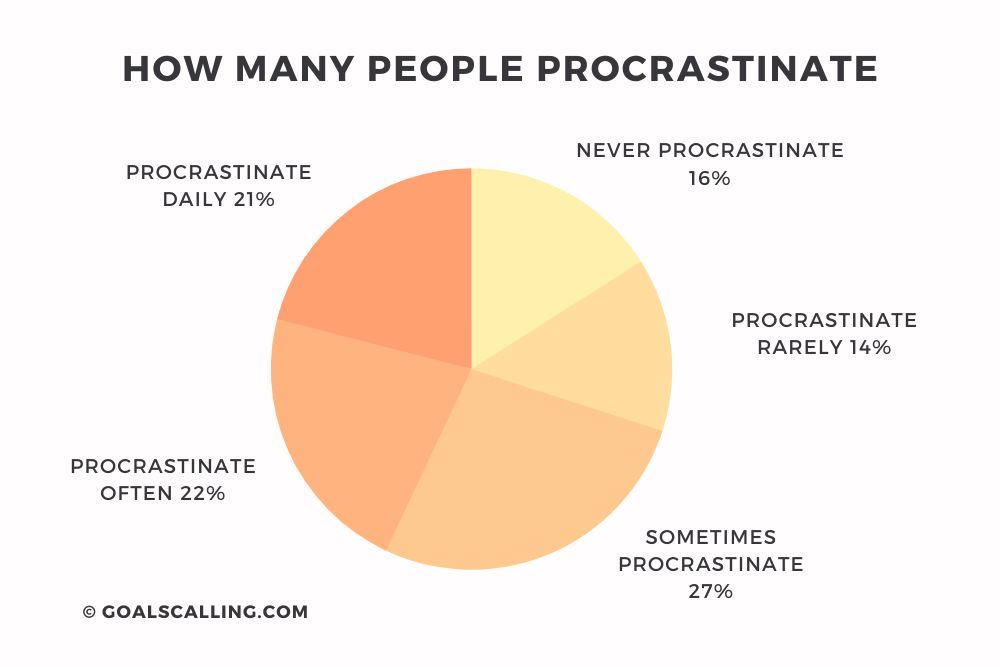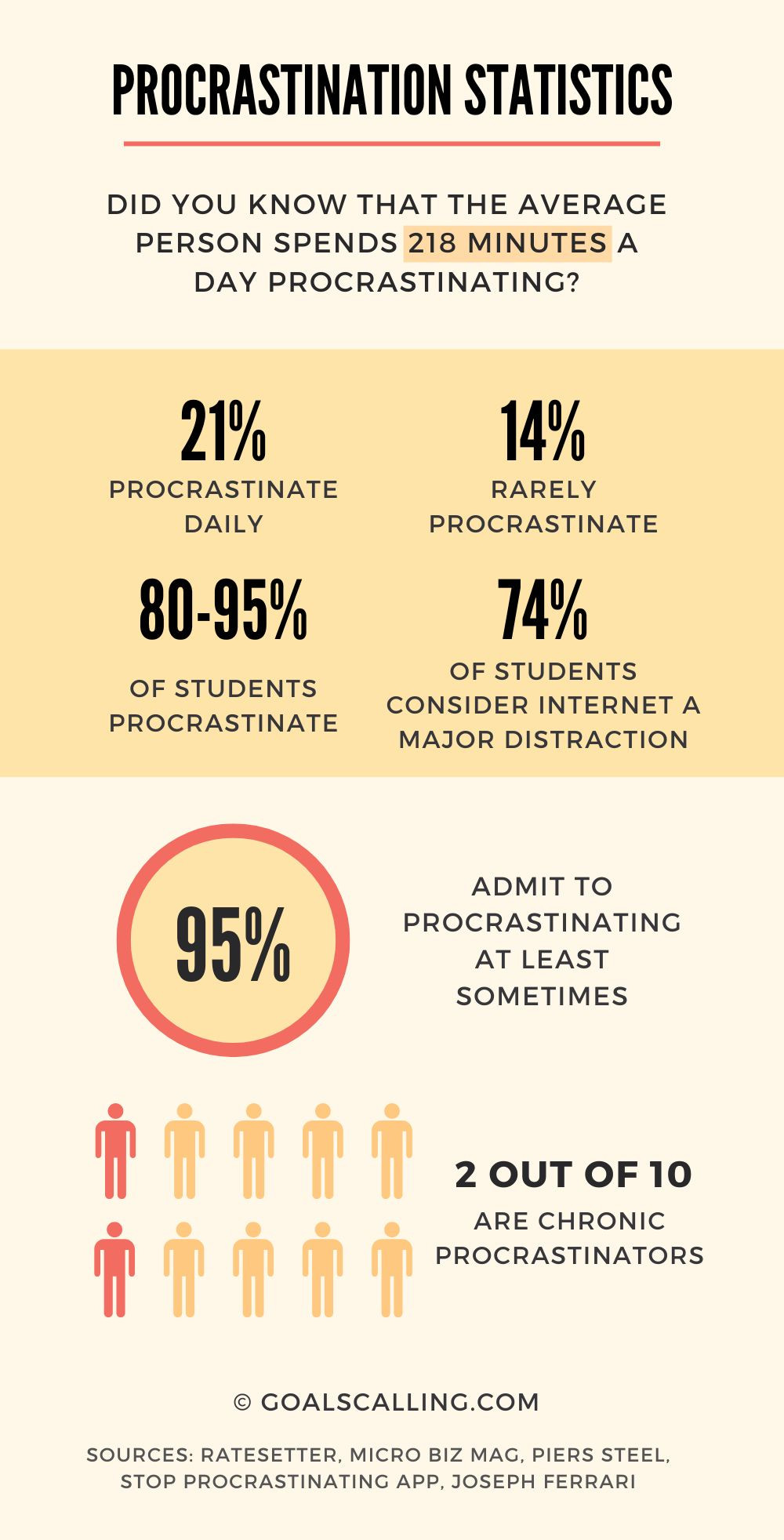All the Procrastination Statistics and Facts That You Need in 2023

If you are looking for all the relevant procrastination statistics, you’ve come to the right place!
Procrastination is shockingly common and as someone who is a big advocate for spending your time well and working to change your life, this topic is very close to my heart. I myself spent years procrastinating, so I know a thing or two about what it’s like to constantly put things off and what it feels like to get barely anything done.
Thankfully, I learned to spend my time better and I have a lot to say about how you can overcome procrastination and why you need to do it right away.
But I’m sure you are eager to get to the most shocking procrastination statistics already, so let’s get to it! You can freely use the infographics in this post, please keep the copyright visible and link back if possible.
How common is procrastination?
Procrastination is fairly common both among the adult population and younger people as well. Probably everyone procrastinates at least at some point in their lives. In one survey, 95% of people admitted to procrastinating.
But when it comes to chronic procrastinators, which means that a person has a tendency to constantly put things off and leave important tasks till the last minute, an estimated 20% of people fall into this group.
96-97% of severe procrastinators consider procrastination a problem, while only 42-48% of the less severe procrastinators do so. Additionally, 35-38% of the former group considered getting help for this, while a mere 5-7% of the latter group thought so.
How often does the average person procrastinate?
If you’re not a severe procrastinator, it’s easy to think that quickly checking Facebook or watching one more episode of your favorite TV show doesn’t really matter. But those minutes quickly add up.
Ratesetter researched the tendency of British people to procrastinate and found that the average person spends 218 minutes a day procrastinating. That amounts to 55 days per year.
A survey in the UK found that while 15.6% of people claim to never procrastinate, everyone else does. Of them:
14.4% procrastinate rarely
27.4% sometimes procrastinate
22.1% procrastinate often
20.5% procrastinate daily

Workplace procrastination statistics
According to one survey, 80% of salaried workers and 76% of entrepreneurs procrastinate 1-4 hours per day, with 88% of the whole workforce procrastinating for at least an hour. 3.3% of salaried workers report procrastinating for over 5 hours.
There weren’t meaningful differences between salaried workers and entrepreneurs in how much people procrastinate. The biggest difference was in the group of people who report procrastinating 2 to 3 hours a day. 24% of entrepreneurs were in this group, but among salaried workers, the number was 35%.
Student procrastination statistics
Not everyone loves school work and having to study for several exams at the same time and write a few essays on top of it would make anyone feel overwhelmed. It’s no wonder that procrastination is common among college students. It’s estimated that between 80 to 95 percent of students procrastinate.
The same study shows that 75% of students consider themselves procrastinators and almost 50% procrastinate consistently. Students often procrastinate because of a fear of failure or because they don’t know how to get started.
Joseph Ferrari, a professor of psychology at DePaul University, has done a lot of studies on why students procrastinate. A 1989 study showed that procrastination correlates with low self-esteem and forgetfulness. Procrastinators are likely to leave a task till the last minute and then speed up the process to get the task done. This can easily lead to poor performance and lower grades.
Procrastination in students has also been linked to higher levels of stress and a negative impact on the student’s well-being. In other words, academic procrastination can exacerbate mental health problems.
Reasons for procrastinating
Not everyone procrastinates for the same reason, but some causes of procrastination are quite common. Some of them include:
– Poor time management
– Inability to concentrate on work
– Fear of failure
– Negative beliefs about one’s capabilities
– Unrealistic expectations
– Perfectionism
Facebook and procrastination
We all know that social media is used for procrastination, sometimes for hours a day, and Facebook is one of the biggest culprits. According to a 2016 article, Facebook increases the academic stress of students and is detrimental to their well-being. Low self-control correlated with a higher frequency of procrastination with Facebook.
In one survey, 74% of students said that the role of internet distractions in their procrastination was significant and worrying. 51% of students are losing at least an hour every day to social media.
How does procrastination affect your mood?
It’s safe to say that procrastination is not going to make you feel good. The overall effects of procrastination are very negative. In fact, procrastination is linked to stress, depression, anxiety, and fatigue, as well as reduced satisfaction across life.
That being said, procrastination might actually improve your mood initially, but it will make it worse later, when you have to face the outcome. It’s easy to feel good when you’re watching cat videos on Facebook instead of writing that difficult report, but it will lead to more stress later when the deadline is approaching.

Statistics of procrastination in the workplace
It’s no wonder that people procrastinate at work. But what does research show about workplace procrastination?
A large study conducted in 2013 reveals that lower salaries, shorter employment, unemployment, and underemployment correlate with higher levels of procrastination. The same study states that women are less likely to procrastinate. They also found that jobs that require stronger motivational skills usually don’t retain people who procrastinate.
How are age and gender linked to procrastination?
A German study conducted in 2016 researched procrastination between the ages of 14 and 95. They found that there were no significant differences between men and women, except among 14-29-year-olds, in which group procrastination was a bit more common among men than women.
The same study found that young people are more likely to procrastinate than older people. This could be because older people have learned better time management techniques and because they view time as a more limited commodity than younger people.
And given that it’s so common for university students to leave things till the last minute, it’s no wonder procrastination is higher in their age group.
One difference between men and women is bedtime procrastination. The term refers to going to bed later than intended. Women are more than twice as likely to struggle with severe bedtime procrastination.
Final thoughts on procrastination statistics
Procrastination is one of the most common forms of self-sabotaging behavior and it can lead to increased stress levels and poor performance. It can have negative consequences in many different areas of your life, including your studies and work, but also at home. Having an ever-growing to-do list of unpleasant tasks is not fun and it can affect your quality of life negatively.
The American Psychological Association reports one interesting fact: not all types of procrastination are as harmful. One study differentiated passive procrastinators from active procrastinators, who procrastinate on purpose because they like the last-minute time pressure.
One thing we can learn from this is that there’s a difference between simply checking social media to avoid discomfort and choosing to leave certain tasks till the last minute knowing that you have everything under control.
The good news is that you can change your life. The best way to combat procrastination and its negative effects on your life is to find the reason for it and learn to be productive. It might be easier said than done, but learning to take that first step will make a huge difference. You will also want to learn better organizational and time management skills.
Lack of motivation is not a problem, lack of action is. I know it’s not easy, but you have the power to change your own life.
Also, if you found these procrastination statistics useful, be sure to check out these goal-setting statistics as well!

